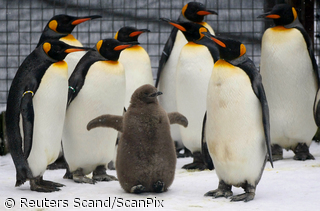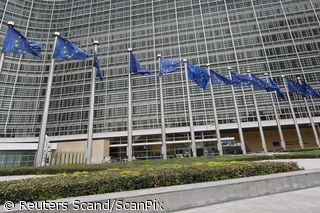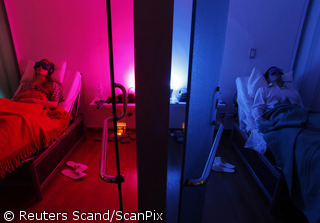An acronym that had dominated headlines at previous CeBIT shows seemed to be little more than a footnote at this year's event
Published:
18 March 2003 y., Tuesday
An acronym that had dominated headlines at previous CeBIT shows seemed to be little more than a footnote at this year's event. The buzz that once accompanied 3G (third-generation) broadband mobile Internet appears to have fizzled even before the service has taken off.
Grabbing the attention this year were wireless technologies, such as Wi-Fi and Bluetooth, that are, above all, available.
Indeed, handset availability, which dogged the start of GSM (Global Service for Mobility Communications) in Europe over a decade ago, threatens to trip mobile operators eager to expand into the market for high-speed mobile Internet services.
Continuing a troubling trend in the European mobile industry, Jьrgen von Kuczkowski, head of Vodafone Group PLC's German unit, said last week in Hanover that the operator will delay the launch of commercial 3G service, this time to the second half of 2003 and only then if enough handsets are available. But Kuczkowski was quick to defuse speculation of possible difficulties, should the operator be forced to announce yet another delay. "There will be no Big Bang" when the German subsidiary launches 3G, he said. "It's not at all important if you start a few weeks earlier or later."
For the record, the delay has been nearly a year. Vodafone D2 GmbH has been paying interest on a huge loan for its Ђ8.5 billion (US$9.2 billion) 3G license acquired more than two years ago, while generating zero revenue from the new mobile broadband service during this time.
Now Kuczkowski is talking about testing 3G with a select number of business users over the next few months. He has also dropped some price points: 3G handsets will cost around Ђ300 and fees for the new high-speed packet-based data services will be low enough to compete with the competition. Those remarks were aimed at rival T-Mobile Deutschland AG, which announced plans ahead of CeBIT to cut its mobile data fees for GPRS (General Packet Radio Service) up to 70 percent, with handsets to range from Ђ100 to Ђ500.
T-Mobile and Vodafone account for roughly 70 percent of the German mobile market, the largest in Europe.
Šaltinis:
itworld.com
Copying, publishing, announcing any information from the News.lt portal without written permission of News.lt editorial office is prohibited.
The most popular articles
 Hundreds of New Yorkers enjoy a dip in rubbish dumpsters that have been converted into swimming pools as part of the city's summer initiative.
more »
Hundreds of New Yorkers enjoy a dip in rubbish dumpsters that have been converted into swimming pools as part of the city's summer initiative.
more »
 On 19 July, a school, which had been reconstructed with the funding from Lithuania’s Special Mission in Afghanistan, was opened in the village of Suri, the Zabul Province in the South of Afghanistan.
more »
On 19 July, a school, which had been reconstructed with the funding from Lithuania’s Special Mission in Afghanistan, was opened in the village of Suri, the Zabul Province in the South of Afghanistan.
more »
 Self-employed workers and their partners will enjoy better social protection – including the right to maternity leave for the first time – under new EU legislation that enters into force today.
more »
Self-employed workers and their partners will enjoy better social protection – including the right to maternity leave for the first time – under new EU legislation that enters into force today.
more »
 A 45 U.S. dollar garage sale purchase turns out to be long lost Ansel Adams negatives worth 200 million dollars.
more »
A 45 U.S. dollar garage sale purchase turns out to be long lost Ansel Adams negatives worth 200 million dollars.
more »
 A Turkish toddler survives a three-floor fall from a balcony when he lands on a stack of plastic pipes.
more »
A Turkish toddler survives a three-floor fall from a balcony when he lands on a stack of plastic pipes.
more »
 Around 200 Magellan penguins, most of them dead, wash up on Uruguay's beaches.
more »
Around 200 Magellan penguins, most of them dead, wash up on Uruguay's beaches.
more »
 Europeans are calling on Member States to boost their efforts to improve road safety, according to a survey published by the European Commission today.
more »
Europeans are calling on Member States to boost their efforts to improve road safety, according to a survey published by the European Commission today.
more »
 With an increase in life expectancy in China has come an accompanying rise in dementia cases, which may leave the younger generation struggling to cope with treatment and care.
more »
With an increase in life expectancy in China has come an accompanying rise in dementia cases, which may leave the younger generation struggling to cope with treatment and care.
more »
 These baby sea turtles should be swimming in the Gulf of Mexico, but instead they are recovering at the Institute for Marine Mammal Studies in Mississippi.
more »
These baby sea turtles should be swimming in the Gulf of Mexico, but instead they are recovering at the Institute for Marine Mammal Studies in Mississippi.
more »
 Reviving the Latin American tradition of the afternoon siesta, a hotel in Argentina brings siesta to the corporate workforce.
more »
Reviving the Latin American tradition of the afternoon siesta, a hotel in Argentina brings siesta to the corporate workforce.
more »